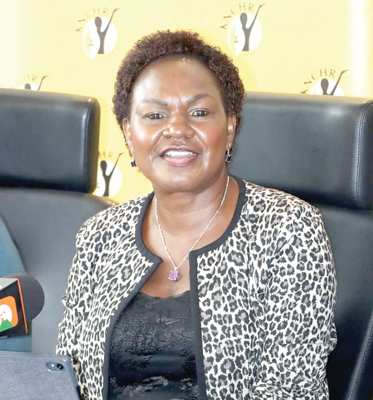Suspend protests in favour of talks, stakeholders urge

Calls to suspend the ongoing anti-government protests intensified yesterday ahead of today’s third round of demonstrations after the country’s human rights’ watchdog warned that the country is at risk of degenerating into anarchy.
At a press conference, the Kenya National Commission on Human Rights (KNCHR) cited violations of several rights as enshrined in the Constitution while issuing the red alert.
Chair Roselyne Odede said the common man has been bearing the brunt of the violations as Azimio pushes on with mass action.
“We are on the brink of the precipice and unless the current unsavory situation is addressed urgently, we run the risk of flying too close to the sun,” she said. “We cannot afford to keep on this trajectory. All political actors and duty-bearers must stand up to be counted.”
Odede said wananchi have suffered physically and financially. “When one is unable to go to mjengo, he loses income. When mama mboga is unable to get to marikiti and make any sales, it amounts to the loss of income. For persons who earn less than a dollar a day, loss of one day’s wages or earnings is life-threatening.”
Mass action
Odede said the mass action has also seen violations of the right to assembly, demonstration, picketing and petition, right to life, freedom and security of the person, freedom of the media, freedom of conscience, religion, belief and opinion, protection of the right to property, economic and social rights and freedom of expression.
“KNCHR calls upon all Kenyans to respect the right to own and acquire property. We also call upon the National Police Service to protect and guard this particular right without fear, favour or bias,” she said.
She said fundamental rights, freedoms and democratic principles enshrined in the Constitution are now at stake.
“The dark and painful past of our country, where political intolerance, negative ethnicity, incitement, lack of safety and security, hooliganism and the emergence of criminal gangs was rife, is once again rearing its ugly head,” she warned.
She said countries that have slipped into the path of disorder and lawlessness have ultimately degenerated into anarchy.
At the same time, the commission called for the freedom of media, raising an alarm over increased cases where journalists have been attacked in line of duty.
“The commission calls on the National Police Service to provide security and protection to journalists covering the protests in line with the Constitution,” said Odede, appealing to civilians to accord the journalists due respect and avoid attacking them in the line of duty.
Police conduct
The International Commission of Jurists (ICJ) yesterday took issue with the way the police conducted itself during the past opposition protests. According to the ICJ, the law enforcers acted with impartiality in their course of duty by failing to observe key constitutional provisions in responding to the situation.
The Commission also did not spare Interior Cabinet Secretary, Kindiki Kithure accusing him of making draconian suggestions regarding amending sections of the Public Order Act.
“Whereas we are calling on the police to act with professionalism, restraint, and respect for human rights at all times, “ Commission Chairman, Protas Saende said while expressing ICJ’s concern over the CS’s suggestion to table in Parliament proposals to amend provisions within the Public Order Management Act.
He described some of Kindiki’s proposals as outrightly unlawful. He called on the National Police Service (NPS) to work closely with the Office of the Directorate of Public Prosecutions (ODPP) and other actors within the justice sector to initiate timely and credible investigations and prosecution of individuals responsible for reported incidences of killing, arson, destruction of property, ethnic profiling, hate speech, incitement, and other crimes committed in connection with the protests.
“Adhere to the guidelines on freedom of association and assembly in line with the letter and spirit of the Constitution,” ICJ advised the police, calling on them to take reasonable steps to protect the rights of peaceful protestors and ensuring that the law and order in the country are all impartial when managing the situation.
ICJ argued that any changes to legal and policy frameworks that react to the protests in public order management must not overreach the letter and spirit of the Constitution, which legitimises peaceful assembly and does not create barriers to the realisation of the right.
Report by Alvin Mwangi, Patricia Obiero and George Kebaso









